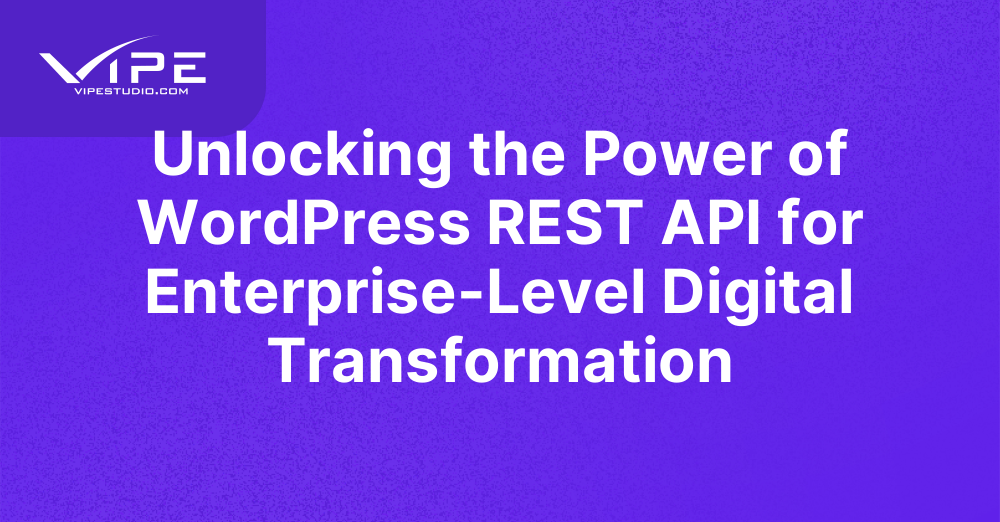05.05.2025
WordPress Development
Unlocking the Power of WordPress REST API for Enterprise-Level Digital Transformation
READING TIME: MIN
Table of Content
In the evolving digital enterprise landscape, integration is everything. For large-scale organizations, content management systems must not only manage content efficiently but also communicate seamlessly with other software systems. This is where the WordPress REST API becomes a cornerstone of enterprise-grade digital transformation.
Understanding the Role of WordPress REST API in Modern Architecture
The WordPress REST API allows developers to interact with WordPress programmatically using HTTP requests and JSON responses. This means WordPress is no longer just a CMS—it becomes a content engine capable of powering mobile apps, internal tools, headless front-ends, and complex integrations.
For enterprises with diverse digital ecosystems, this provides the flexibility to build tailored solutions without being confined to WordPress’s traditional front-end output.
Decoupled Systems Thrive with WordPress as a Headless CMS
By using the REST API, enterprises can adopt a headless architecture—where the front-end (e.g., built in React, Next.js, or Angular) is completely separate from the WordPress back-end. This approach improves performance, allows for greater creative freedom, and supports omnichannel experiences across platforms like mobile apps, kiosks, and smart devices.
Vipe Studio provides full support for Headless WordPress solutions, including decoupled front-ends built with enterprise frameworks like Next.js.
Streamlining Internal Workflows with Custom API Endpoints
Large businesses often need to integrate content workflows with CRMs, marketing automation tools, or proprietary internal systems. WordPress’s extensible REST API makes this possible by allowing custom endpoints. These can push or pull data between WordPress and external platforms securely and efficiently.
- Sync product data with e-commerce platforms
- Distribute editorial content to partner portals
- Collect data from IoT devices or form submissions
Ensuring Security and Compliance in Enterprise API Integrations
Enterprise applications often operate under strict data protection policies. WordPress REST API can be secured using authentication methods such as OAuth2, API keys, or JWT. Role-based access control and SSL encryption further ensure that sensitive information is only accessible to the right systems and users.
At Vipe Studio, we prioritize API security architecture and help enterprises audit and implement secure REST interactions.
Scalability Considerations When Building API-Driven WordPress Platforms
When building high-traffic or high-volume REST APIs, enterprises must think beyond development. Caching strategies, load balancing, rate limiting, and asynchronous processes can all help ensure stability under load.
Whether you’re serving thousands of API calls per minute to a front-end application or integrating with a fast-moving data pipeline, a well-planned architecture is critical.
Future-Proofing Enterprise Applications with API-First Thinking
Using WordPress as part of an API-first strategy enables your digital infrastructure to evolve over time. Whether it’s migrating to a new front-end framework, adding new data sources, or expanding into new markets, API-based architecture provides the flexibility to adapt.
To explore how your business can leverage the WordPress REST API for greater integration and performance, reach out to Vipe Studio for a consultation.
More on The Topic
- Navigating WooCommerce Performance: Real-World Strategies
- The Role of AI in WordPress Development Workflows
- Optimizing WordPress for Enterprise: Beyond Basic Caching
- WordPress and Headless Commerce: A Provocative Dilemma
- Decoupled WordPress Architecture: The Future or a Fad?
The content of this website is copyrighted and protected by Creative Commons 4.0.



